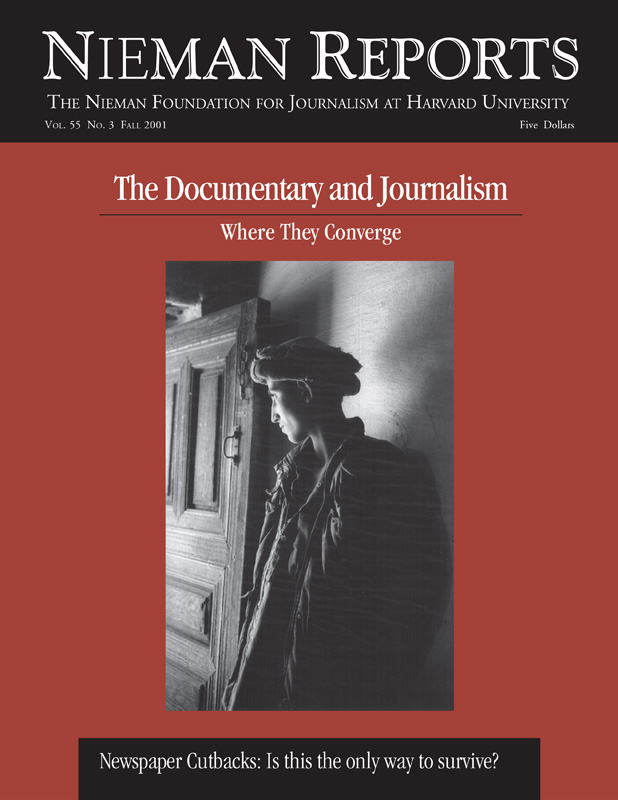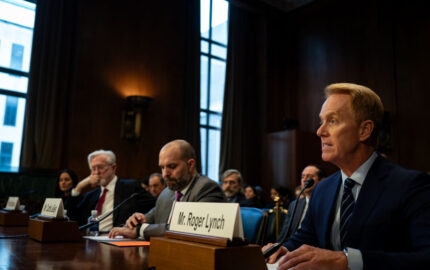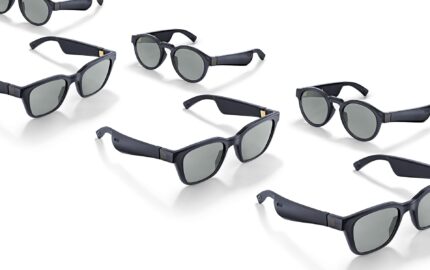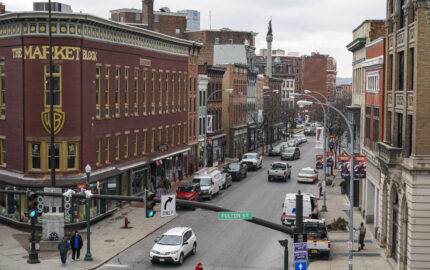What separates radio documentary from any documentary? And what separates public radio journalism from any journalism?
Radio gets inside us. Lacking earlids, we are defenseless, vulnerable to ambush. Sounds and voices surprise us from within. As radio documentary makers, we have this tactical advantage over our colleagues in print, film, television and photography. Our tool is aural story, the most primitive and powerful. Invisibility is our friend. Prejudice is suspended while the listener is blind, only listening.
Perhaps this distinguishing trait lies quietly near the heart of public radio journalism, close to the utopian ideal that we use these airwaves to share our stories as we try to understand each other better, to not be afraid of each other, to come a little closer together.
We’re not regular media, after all, or even regular journalism. We have a calling to mission and public service that exists outside the marketplace and squarely in the civic realm. We can serve that mission through traditional reporting and documentary, but we also help citizens speak for themselves, to one another, directly.
I got into public radio because someone at NPR loaned me a tape recorder and microphone. It was the mid-70’s and NPR was just inventing itself, always a good time to join an enterprise. I used the recorder as a passport into every part of life that seemed interesting. I could find out about anything I wanted. Amazing. At the beginning, I was simply a citizen, suddenly armed with the tools of production and a means of distribution, an independent journalist being born. By apprenticing at the news shows, reading everything I could get my hands on, and prodding my elders with questions, I learned the trade on the fly and in the next 25 years made hundreds of radio features, documentaries and series. For much of that time, I’ve also been loaning out tape recorders and tools to others, encouraging citizen voices on the air, repaying and replaying my own start.
In an age of corporate consolidation of the press on one hand and cheap bogus Internet journalism on the other, it is more important than ever to bring a range of voices to the air in a sane and respectful way. The public radio journalist can assume a shepherding role.
Life Stories
www.atlantic.org
My first batch of tape recorders went out beginning in the 1980’s with the series “Life Stories,” which sought out stories that seemed best told from the source. (A six-hour collection aired on NPR stations this summer.) It’s hard to say how I found the storytellers, but once I declared I was interested, they seemed to cross my path. I equipped them, instructed them in the use of the gear, and worked with them editorially, often bringing them to mix in my home recording studio.
The grown son of concentration camp survivors accompanies his parents on their visit to the Holocaust Museum; he hopes they’ll talk to him about their experience for the first time in his life. He asks for a recorder. A young woman wants to revisit the scenes and characters of her hospitalization and near-death from anorexia 10 years before. She needs the passport of the recorder to enter her own past. These sorts of stories cannot be told best from outside. They are better lived and narrated by the principals, the main characters in the stories of their lives.
Radio is well suited to the “diary” form. It’s inherently intimate, confidential, lends itself to scribbled notes, fragments and whispered entries at night. The technical inexperience of the diarist doesn’t show as clearly as it does in video, or even in print, and therefore doesn’t get in the way. As the eventual producer/editor, you are there, but you disappear. The journalist must be facilitator, fact-checker, ethicist, but not puppet-master, allowing the listener an authentic, direct, empathetic encounter with the teller.
Lost & Found Sound
www.lostandfoundsound.com
Our series “Lost & Found Sound” (produced with the Kitchen Sisters, Nikki Silva and Davia Nelson for NPR’s “All Things Considered”) offered another tool to the citizen storyteller—voice mail. We asked listeners to call and tell us about precious audio artifacts they’d saved. In my role as “curator” I poured through hundreds of these messages, and in virtually every case the phone message itself became the spine of the piece. In the message was the story, the link between the caller and the sound.
The callers, in telling of their treasures, seemed to be in the presence of the past. The voices they described were in the air around them, true ghosts, filled with breath, as real as a lock of hair. Some of the recordings were intensely personal—the lullaby of an immigrant grandparent, the answering machine message from a child given up for adoption. Others fell at the intersection between the individual and history—a family’s recording of an ancestor’s eyewitness account of the Gettysburg Address; reels of tape made in the fighting holes of Vietnam, brought to us by the platoon mate of the 19-year-old Marine who recorded them and died there.
In every case, the direct connection of the living citizen to the sounds of the past was the key. We called it “the universal ancestor effect.” A grandfather’s voice, enhanced by the love of the grandchild who tells us about it, then shared on the radio, is somehow transformed to become everyone’s grandfather. In the absence of a concrete and distancing visual image, an invisible human link is made and, for that instant, nationalities and races are joined through voice and memory. All the dead are one. Your mother is mine. Only radio, and only public radio at that, has the uncanny means and the actual calling to make that happen.
WCAI & WNAN
www.cainan.org
We have brand new public radio stations here on Cape Cod, Martha’s Vineyard, and Nantucket in Massachusetts, the newest in America. We wanted them to sound like here, not just anywhere. A place defines itself by its stories, and we have chosen to broadcast our citizens’ stories on and off all day, unexpectedly—portraits, oral histories, poems, anecdotes, memories, fragments of life overheard. They pop up during every national show around the clock, short bursts of life as experienced or remembered by all of us who live here. They are the thread in the fabric of our broadcast day.
The effect is startling, unexpected. You are listening to news of the world and then, during a pause, an unheralded speaker—a local elder or high-school kid or sandwich maker or scientist—pops in. The voices of our neighbors, surprising us, are given equal weight with events on the world stage.
The concept has become wonderfully popular here. Learning from “Lost & Found Sound,” we’ve also installed voice mail where people can tell us about something that happened years ago, or that morning. Learning from “Life Stories,” we buy old cassette recorders from eBAY to loan to whomever promises to use them.
Listeners have said that these little breaks not only contribute to community, they actually build it. We live in a place that is geographically fragmented (islands, after all) and each region feels itself to be more “special” than the others. Yet the radio signal extends across them all, disrespecting the boundaries. We have feuds and jealousies, political division, parochial ignorance (Is it so different from anywhere else?), but these stories tend, almost miraculously, to break those down. When a story begins, we don’t know where the teller is from, so we listen, without judgment. We like what we hear. But then, when we discover the teller is not from our island, we must decide how to incorporate the contradiction that may lead us, helplessly, to acceptance. “Well, I guess they’re not all bad over there,” we think. And, eventually, we may even come to think of their stories as our stories.
Transom.org
www.transom.org
Finally, the Internet. If there’s democracy in storytelling, it’s here. If there’s an openly accessible way to pass on what we’ve done before in public radio and to try to make things better, it’s here. Our current attempt is Transom.org (a project of Atlantic Public Media). We call it a showcase and workshop for new public radio, and we premiered the Web site in February. It’s a combination library, master class, and audition stage.
The site showcases new work from first-time producers and unheard work from established producers. As I write this, the featured piece is a 40-year-old, and utterly contemporary, documentary from Studs Terkel, which never received a national broadcast. Last month, it was a documentary from a first-time producer in Seattle using his mini-disc recorder, and skills he picked up at Transom, to craft a remarkable story about his friend’s suicide.
Transom holds or links to virtually all the tools—technical, editorial, philosophical—people would need to tell their own radio stories. Encouragingly, quite a few high-school and college students are frequenting the site and their work has been featured there.
RELATED ARTICLE
"Listening to Radio Talk"
- Excerpts from Transom discussion boardsEach month a new special guest writes a “manifesto” and hangs around the site, critiquing new work and making conversation. Recent guests: Tony Kahn, Scott Carrier, Paul Tough, The Kitchen Sisters, Sarah Vowell, Studs Terkel. Editors, producers and managers throughout the public radio system read and listen to this work and participate in these conversations, but they are also there for anyone to read, listen to and join.
Producers and citizens gather at Transom.org to talk about radio documentary and to try their hands at it. Subjects of documentaries talk with those who made them and to listeners about editorial and stylistic choices. The site encourages an interactive, self-correcting, open-eared, civic journalism made possible by the Internet and extended to public radio.
The site represents virtual street-level access to national air, as most Transom stories end up adopted by a national program. An on-air mention of Transom.org drives listeners back to the Web, making a creative circle between the traditional media and the new. At Transom.org, we have a voice mail line to collect stories, we loan out tape recorders, and we broadcast Transom pieces locally on WCAI and WNAN.
So, everything ends up tied together.
Journalists help citizens reach the air, to tell of their lives. Public radio carries the voices out and back, across a borderless country populated by the living and the dead. Citizen stories are shared out loud, journalists mediating the exchange, partners in the mission. Somewhere between the din of the Internet and the drone of corporate media is a place for these voices, testifying on their own behalf.
Jay Allison is an independent broadcast journalist living in Woods Hole, Massachusetts. He is founder and executive producer of WCAI/WNAN and Atlantic Public Media. His radio documentaries air often on NPR and his solo-crew video documentaries on ABC News “Nightline.”
Radio gets inside us. Lacking earlids, we are defenseless, vulnerable to ambush. Sounds and voices surprise us from within. As radio documentary makers, we have this tactical advantage over our colleagues in print, film, television and photography. Our tool is aural story, the most primitive and powerful. Invisibility is our friend. Prejudice is suspended while the listener is blind, only listening.
Perhaps this distinguishing trait lies quietly near the heart of public radio journalism, close to the utopian ideal that we use these airwaves to share our stories as we try to understand each other better, to not be afraid of each other, to come a little closer together.
We’re not regular media, after all, or even regular journalism. We have a calling to mission and public service that exists outside the marketplace and squarely in the civic realm. We can serve that mission through traditional reporting and documentary, but we also help citizens speak for themselves, to one another, directly.
I got into public radio because someone at NPR loaned me a tape recorder and microphone. It was the mid-70’s and NPR was just inventing itself, always a good time to join an enterprise. I used the recorder as a passport into every part of life that seemed interesting. I could find out about anything I wanted. Amazing. At the beginning, I was simply a citizen, suddenly armed with the tools of production and a means of distribution, an independent journalist being born. By apprenticing at the news shows, reading everything I could get my hands on, and prodding my elders with questions, I learned the trade on the fly and in the next 25 years made hundreds of radio features, documentaries and series. For much of that time, I’ve also been loaning out tape recorders and tools to others, encouraging citizen voices on the air, repaying and replaying my own start.
In an age of corporate consolidation of the press on one hand and cheap bogus Internet journalism on the other, it is more important than ever to bring a range of voices to the air in a sane and respectful way. The public radio journalist can assume a shepherding role.
Life Stories
www.atlantic.org
My first batch of tape recorders went out beginning in the 1980’s with the series “Life Stories,” which sought out stories that seemed best told from the source. (A six-hour collection aired on NPR stations this summer.) It’s hard to say how I found the storytellers, but once I declared I was interested, they seemed to cross my path. I equipped them, instructed them in the use of the gear, and worked with them editorially, often bringing them to mix in my home recording studio.
The grown son of concentration camp survivors accompanies his parents on their visit to the Holocaust Museum; he hopes they’ll talk to him about their experience for the first time in his life. He asks for a recorder. A young woman wants to revisit the scenes and characters of her hospitalization and near-death from anorexia 10 years before. She needs the passport of the recorder to enter her own past. These sorts of stories cannot be told best from outside. They are better lived and narrated by the principals, the main characters in the stories of their lives.
Radio is well suited to the “diary” form. It’s inherently intimate, confidential, lends itself to scribbled notes, fragments and whispered entries at night. The technical inexperience of the diarist doesn’t show as clearly as it does in video, or even in print, and therefore doesn’t get in the way. As the eventual producer/editor, you are there, but you disappear. The journalist must be facilitator, fact-checker, ethicist, but not puppet-master, allowing the listener an authentic, direct, empathetic encounter with the teller.
Lost & Found Sound
www.lostandfoundsound.com
Our series “Lost & Found Sound” (produced with the Kitchen Sisters, Nikki Silva and Davia Nelson for NPR’s “All Things Considered”) offered another tool to the citizen storyteller—voice mail. We asked listeners to call and tell us about precious audio artifacts they’d saved. In my role as “curator” I poured through hundreds of these messages, and in virtually every case the phone message itself became the spine of the piece. In the message was the story, the link between the caller and the sound.
The callers, in telling of their treasures, seemed to be in the presence of the past. The voices they described were in the air around them, true ghosts, filled with breath, as real as a lock of hair. Some of the recordings were intensely personal—the lullaby of an immigrant grandparent, the answering machine message from a child given up for adoption. Others fell at the intersection between the individual and history—a family’s recording of an ancestor’s eyewitness account of the Gettysburg Address; reels of tape made in the fighting holes of Vietnam, brought to us by the platoon mate of the 19-year-old Marine who recorded them and died there.
In every case, the direct connection of the living citizen to the sounds of the past was the key. We called it “the universal ancestor effect.” A grandfather’s voice, enhanced by the love of the grandchild who tells us about it, then shared on the radio, is somehow transformed to become everyone’s grandfather. In the absence of a concrete and distancing visual image, an invisible human link is made and, for that instant, nationalities and races are joined through voice and memory. All the dead are one. Your mother is mine. Only radio, and only public radio at that, has the uncanny means and the actual calling to make that happen.
WCAI & WNAN
www.cainan.org
We have brand new public radio stations here on Cape Cod, Martha’s Vineyard, and Nantucket in Massachusetts, the newest in America. We wanted them to sound like here, not just anywhere. A place defines itself by its stories, and we have chosen to broadcast our citizens’ stories on and off all day, unexpectedly—portraits, oral histories, poems, anecdotes, memories, fragments of life overheard. They pop up during every national show around the clock, short bursts of life as experienced or remembered by all of us who live here. They are the thread in the fabric of our broadcast day.
The effect is startling, unexpected. You are listening to news of the world and then, during a pause, an unheralded speaker—a local elder or high-school kid or sandwich maker or scientist—pops in. The voices of our neighbors, surprising us, are given equal weight with events on the world stage.
The concept has become wonderfully popular here. Learning from “Lost & Found Sound,” we’ve also installed voice mail where people can tell us about something that happened years ago, or that morning. Learning from “Life Stories,” we buy old cassette recorders from eBAY to loan to whomever promises to use them.
Listeners have said that these little breaks not only contribute to community, they actually build it. We live in a place that is geographically fragmented (islands, after all) and each region feels itself to be more “special” than the others. Yet the radio signal extends across them all, disrespecting the boundaries. We have feuds and jealousies, political division, parochial ignorance (Is it so different from anywhere else?), but these stories tend, almost miraculously, to break those down. When a story begins, we don’t know where the teller is from, so we listen, without judgment. We like what we hear. But then, when we discover the teller is not from our island, we must decide how to incorporate the contradiction that may lead us, helplessly, to acceptance. “Well, I guess they’re not all bad over there,” we think. And, eventually, we may even come to think of their stories as our stories.
Transom.org
www.transom.org
Finally, the Internet. If there’s democracy in storytelling, it’s here. If there’s an openly accessible way to pass on what we’ve done before in public radio and to try to make things better, it’s here. Our current attempt is Transom.org (a project of Atlantic Public Media). We call it a showcase and workshop for new public radio, and we premiered the Web site in February. It’s a combination library, master class, and audition stage.
The site showcases new work from first-time producers and unheard work from established producers. As I write this, the featured piece is a 40-year-old, and utterly contemporary, documentary from Studs Terkel, which never received a national broadcast. Last month, it was a documentary from a first-time producer in Seattle using his mini-disc recorder, and skills he picked up at Transom, to craft a remarkable story about his friend’s suicide.
Transom holds or links to virtually all the tools—technical, editorial, philosophical—people would need to tell their own radio stories. Encouragingly, quite a few high-school and college students are frequenting the site and their work has been featured there.
RELATED ARTICLE
"Listening to Radio Talk"
- Excerpts from Transom discussion boardsEach month a new special guest writes a “manifesto” and hangs around the site, critiquing new work and making conversation. Recent guests: Tony Kahn, Scott Carrier, Paul Tough, The Kitchen Sisters, Sarah Vowell, Studs Terkel. Editors, producers and managers throughout the public radio system read and listen to this work and participate in these conversations, but they are also there for anyone to read, listen to and join.
Producers and citizens gather at Transom.org to talk about radio documentary and to try their hands at it. Subjects of documentaries talk with those who made them and to listeners about editorial and stylistic choices. The site encourages an interactive, self-correcting, open-eared, civic journalism made possible by the Internet and extended to public radio.
The site represents virtual street-level access to national air, as most Transom stories end up adopted by a national program. An on-air mention of Transom.org drives listeners back to the Web, making a creative circle between the traditional media and the new. At Transom.org, we have a voice mail line to collect stories, we loan out tape recorders, and we broadcast Transom pieces locally on WCAI and WNAN.
So, everything ends up tied together.
Journalists help citizens reach the air, to tell of their lives. Public radio carries the voices out and back, across a borderless country populated by the living and the dead. Citizen stories are shared out loud, journalists mediating the exchange, partners in the mission. Somewhere between the din of the Internet and the drone of corporate media is a place for these voices, testifying on their own behalf.
Jay Allison is an independent broadcast journalist living in Woods Hole, Massachusetts. He is founder and executive producer of WCAI/WNAN and Atlantic Public Media. His radio documentaries air often on NPR and his solo-crew video documentaries on ABC News “Nightline.”



